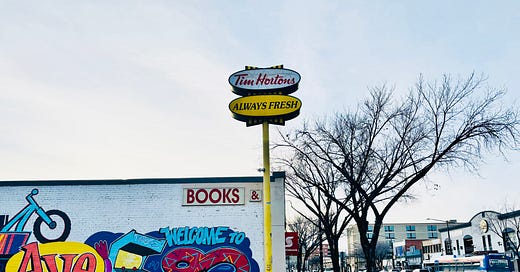I spent last weekend alone in Edmonton, Alberta. I flew in to speak at a teachers' convention, which happened on the morning of the first day. (It went great. I'm booking more gigs if you need a speaker!) Then I had another 24 hours to explore the city. It was my first time in Edmonton, though I've given a surprising amount of thought to this city over the years.
When I was a teenager, my 75-year-old grandmother called to invite me to a wedding. "Whose is it?" I asked. "Mine," she said.
It turned out, she had fallen in love with a man she'd known 50 years prior in university—a man who'd even been in her wedding party when she married my grandfather long ago. They were getting married, and she was moving to Edmonton to live with him.
I was happy for her, but selfishly, I felt betrayed by her departure. I resented Edmonton for a long time, thinking of it as a stealer of grandmas, a place that elderly women went in search of romantic adventure late in life.
My grandma loved the city. She wrote letters to me about all the exciting things she was doing. She described the beautiful river valley and trails she walked each day. She wrote about the warm, friendly people she met, about her husband's family, about the big, wide streets she now had to navigate in his "boat" of a car, about the vast West Edmonton Mall, the largest in North America, and her new church community.
She came back to Ontario several times a year, so I didn't have a chance to visit her out west before her husband died of cancer, three years after their wedding. That was, I believe, the last great adventure of her life. She returned to her cozy old farmhouse in Niagara to spend the final 16 years of her life. She died a few months before the Covid pandemic hit.
I think about my grandma frequently, and I thought about her even more as I walked the streets of her former city. Even before she moved there, we used to write letters almost weekly. This continued into my university and early parenting years. She was the world's greatest pen pal, never failing to respond promptly to any letter I sent, which in turn spurred me to write back. There was rarely a lull in our epistolary frenzy.
As I wandered the streets last weekend, I thought about the letter I would write to her now. I would tell her that, yes, Edmonton's river valley is strikingly beautiful, even when it's choked with ice. I would tell her that walking across the old Highline bridge that spans the north and south banks of the city was a bit scary because it's so high—messy, too, because passing cars sprayed me with slush.
I would tell her about the shops I explored, like the spice merchant where I bought exotic ingredients I can't find in rural Ontario, like lime leaves and galangal, and the fancy stationery store where I finally splurged on the Blackwing pencils I've coveted for months. I even bought some gorgeous letter-writing paper, but I'm not sure who I'll use it for; no one writes back anymore. She would have been the first to see it.
I would tell my grandma about the Japanese knife store, where a salesman had me slice a tomato with a blade that made it feel like soft butter, an apparent rite of passage for first-time visitors. When he said, "Go get in some trouble tonight," I said, "Always!" Everyone in the store laughed, and I walked out the door with laughter still tickling my throat.
I stepped out into warm golden sunshine. People passed me in T-shirts. I'd write, "Grandma, you forgot to tell me that Edmonton feels like a tropical paradise compared to Ontario!" It was 11˚C, and my winter-pale face got a sunburn. Back home, it was -20˚C with the wind chill, with several highways closed due to whiteout conditions. It would be a long, slow drive home from the airport.
Grandma would have loved to hear about the fabulous secondhand bookstore where I found a copy of The Twittering Machine, a book I've wanted to read for years. And she would urge me to try to recreate the chewy coconut mochi donut I ate in the Paris Café, sitting across from a couple whose entire faces were covered in tattoos. She would disapprove. It was hard not to stare.
Then I'd tell her about buying a ticket (for one!) and buttery popcorn (dinner!) at the Metro Cinema, a gorgeous old independent theatre. I watched a special screening of "I'm Still Here," an Oscar-winning Brazilian film that, for two glorious hours, transported me to the beaches of Rio de Janeiro and the not-so-idyllic horrors of the military dictatorship during the 1970s.
I was riveted, not just by the lead actress' stupendous performance, but also by the beauty of their family life—and the mother's fortitude in the face of her husband's disappearance. I was struck by how rare it is for a family to be depicted nowadays as being each other's favourite people, even through hardship.
As the film progressed, I could feel the rust slowly falling away from my Portuguese. It has been 10 years since I spent a month in that same part of Rio. Even harder to believe, it has been 19 years since I lived in the northeast of that country and studied the language intensively for a year. I wish I could ask my grandma, where does time go? If anyone knows, it would be her; if not, maybe she could tell me how to squeeze a little more out of it.
Grandma used to tell me, near the end of her life, that she no longer felt useful to anyone. She missed the days of being needed.
"You're lucky to have those little boys," she said, which I already knew, but I was also overwhelmed by the demands of babies and toddlers.
"You just forget how much work this is!" I protested, but she shook her head.
"You'll miss it soon enough."
If I could write her today, I'd tell her how odd yet wonderful it felt to be alone for hours on end, to inhabit a silent space that was never interrupted unless I chose to talk to friendly knife salesmen with spare tomatoes. At home, I live in a vortex of questions and comments from my children; if they're not talking, they are laughing, singing, stomping, shrieking. Silence is so rare that I sometimes forget it exists, so this past weekend, I luxuriated in it, aware that it was fleeting.
Soon enough, I would wake up in my own bed, and my solo weekend would feel like a distant dream, a bit like the memory of my grandma that gets fainter with every year that passes. And I wonder if someday my own grandchildren will walk the streets of some faraway city—one that I haven't even visited yet—and think of me.
You Might Also Like:
In the News:
Several weeks ago, I had a lovely conversation with journalist Elizabeth Narins, who writes a Substack newsletter called More Than Mom. She asked smart, engaging questions that made conversation flow easily (I always love when that happens), and then she turned our chat into a lovely lengthy article.
Check it out if you’re looking for some advice and inspiration on dealing with screen overload at home (and who isn’t?!): “The Kids Watching Shows on Your Phone Are Not Alright.”
Have You Read My Book?
Childhood Unplugged: Practical Advice to Get Kids Off Screens and Find Balance is available in paperback, PDF, or audiobook. If you love it, as many other readers have (it’s got a 4.9-star rating!), consider leaving a review on Amazon, which my publisher tells me is a huge help for boosting sales and visibility. If you’d like to learn more about my work, please check out my website.
A Small Reminder:
I am able to write this newsletter twice a week and keep it open to the general public, thanks to generous readers who enjoy my words enough to sign up for a paid subscription! It’s entirely a labour of love and it takes a LOT of time and effort to do. Paid subscribers are a sign that I’m on the right track.







I live in Edmonton and this was really nice to read! People here are really negative about the city but I think there are many positives. Especially after coming back from abroad, I have a newfound appreciation for the diverse food culture.
What a moving piece about thoughts and connections through time and space - your grandchildren and your grandmother, linked by your reflections.
And what a pleasant surprise to hear you watched our "I'm Still Here," a film that represents so much to us in Brazil.
We have a child's book called 'Bisa Bia, Bisa Bel' (Bisa being short for bisavó, great grandmother) where this girl Isabel finds a picture of her great grandmother when she was a girl and she comes in touch with her in her head and eventually imagines herself as a great grandmother and talking to the girl who is going to be her great granddaughter.